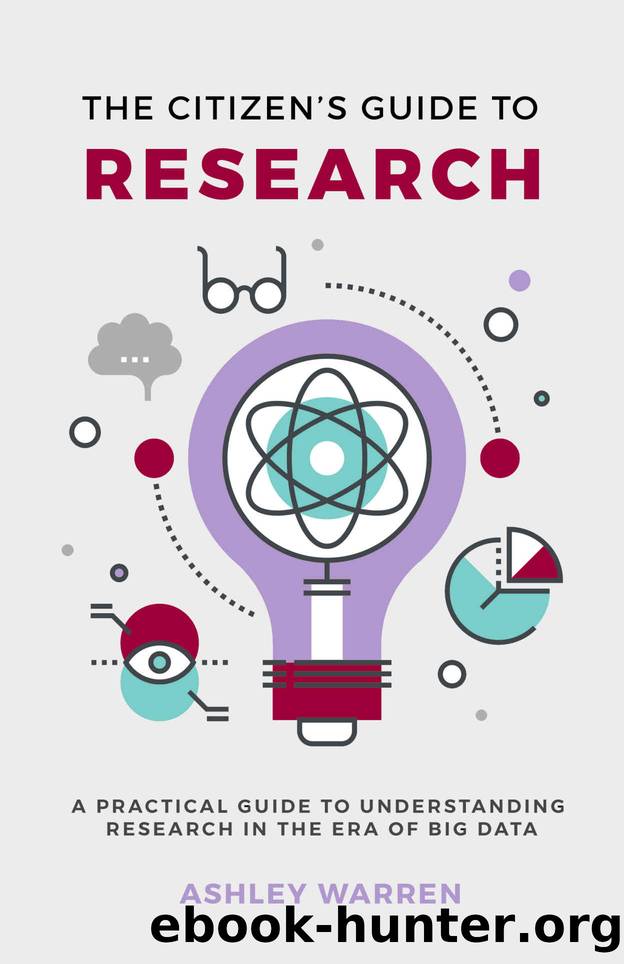The Citizen's Guide to Research: A Practical Guide to Understanding Research in the Era of Big Data by Ashley Warren

Author:Ashley Warren [Warren, Ashley]
Language: eng
Format: azw3
Publisher: Ashley Warren Research
Published: 2017-10-02T00:00:00+00:00
Determine what type of question youâre asking
Rephrasing your question also helps you to figure out what type of question youâre asking.
The type of question youâre asking impacts the methodology of your study â basically, how you plan to conduct your research and analyze the findings. Weâll talk about methodology in the coming chapters, so donât concern yourself with that just yet, but you can start by identifying what type of question youâre asking.
Three main types of questions:
Causal Questions â Compares two or more phenomena and determines if a relationship exists. Often called relationship research questions. Example: Does the amount of calcium in the diet of elementary school children effect the number of cavities they have per year?
Descriptive Questions â Seek to describe a phenomena and often study âhow muchâ, âhow oftenâ, or âwhat is the changeâ. Example: How often do college-aged students use Twitter?
Comparative Questions â Aim to examine the difference between two or more groups in relation to one or more variables. The questions often begin with âWhat is the difference in...â. Example: What is the difference in caloric intake of high school girls and boys?
â Center for Innovation in Research and Teaching
Download
This site does not store any files on its server. We only index and link to content provided by other sites. Please contact the content providers to delete copyright contents if any and email us, we'll remove relevant links or contents immediately.
Periodization Training for Sports by Tudor Bompa(8254)
The Body: A Guide for Occupants by Bill Bryson(5080)
The MacArthur Bible Commentary by John MacArthur(4823)
The Sports Rules Book by Human Kinetics(4379)
What It Really Takes to Get Into Ivy League and Other Highly Selective Colleges by Hughes Chuck(3751)
Marijuana Grower's Handbook by Ed Rosenthal(3677)
The Sprouting Book by Ann Wigmore(3587)
The Martian by Andy Weir(3417)
Salt, Fat, Acid, Heat: Mastering the Elements of Good Cooking by Nosrat Samin(3142)
Sapiens and Homo Deus by Yuval Noah Harari(3068)
The Bread Bible by Rose Levy Beranbaum(3066)
Harry Potter 4 - Harry Potter and The Goblet of Fire by J.K.Rowling(3060)
The Marketing Plan Handbook: Develop Big-Picture Marketing Plans for Pennies on the Dollar by Robert W. Bly(3047)
Classic by Mary Berry(3010)
Martha Stewart's Baking Handbook by Martha Stewart(2854)
Screenplay: The Foundations of Screenwriting by Syd Field(2636)
The Plant Paradox by Dr. Steven R. Gundry M.D(2611)
50 Economics Classics by Tom Butler-Bowdon(2568)
The Cambridge Grammar Of The English Language by Rodney Huddleston Geoffrey K. Pullum(2417)
